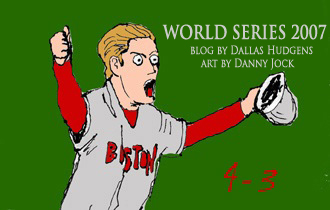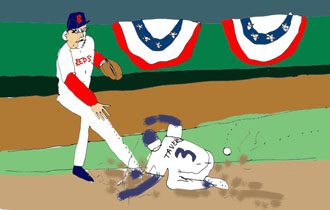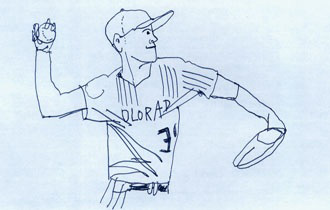World Series 2007 Blog
26.10.07
The night had a feeling of inevitability as soon as Boston leadoff hitter Jacoby Ellsbury rapped another double to open Game 4 of the World Series. Maybe the Red Sox would make this as quick and as painless as a four-hour baseball game can get.
But after David Ortiz singled Ellsbury home to give Boston a 1-0 lead, Colorado right-hander Aaron Cook, starting his first game since August 10th due to an oblique strain, settled in and held Boston to three runs over six innings.
No one could have reasonably expected a much better performance from Cook after a long layoff and against such a potent lineup. Unfortunately for Rockies’ fans, Boston’s young lefty starter, Jon Lester, was dealing sharp sliders and 90 mile-per-hour fastballs to their own struggling hitters in posting 5 2/3 scoreless innings as the Red Sox finished off the Rockies and this year’s World Series 4-3 Sunday night.
Like Cook, Lester could have been forgiven for carrying some rust. His last start had come a page back on the calendar: September 26 against the Oakland Athletics. Since then, he had pitched twice in relief against the Indians in the ALCS.
The 23-year-old Lester had been gaining strength over the entire 2007 season after being diagnosed with anaplastic large-cell lymphoma in September of last year. At the time, Lester was 7-2 and one of the most promising young pitchers in baseball.
Lester underwent six rounds of chemotherapy during the off-season, was declared cancer free, and returned to the Red Sox in Spring Training. Since the club’s starting rotation was already solid, the Red Sox were both careful and patient with Lester as he built his stamina and finally rejoined the big-league club in late July. He went 4-0 for the season with a 4.57 ERA.
When Tim Wakefield was unable to pitch in the Series due to shoulder problems, Lester inherited the Game 4 start. The pressure could have been a lot worse. With Boston already up 3-0 in the series and Josh Beckett ready to start Game 5, a loss on Sunday night likely would not have shaken the mountainous hopes of the Red Sox nation faithful who’d traveled to Coors Field.
But Lester was both strong and sharp, handing the ball to the formidable Red Sox bullpen with a 2-0 lead. He was helped out by Series MVP Mike Lowell, who doubled and scored in the 5th inning before hitting a solo homer in the 7th.
 Looking toward 2008, the Red Sox appear to have a perfect blend of young talent and veteran presence that could see them visiting another National League park next October. With Curt Schilling likely exiting Boston and Wakefield both injured and 41-years-old, Lester and 23-year-old right-hander Clay Buchholz, who pitched a no-hitter in only his second major league start this season, wait to join the starting rotation alongside Beckett and Daisuke Matsuzaka. Boston could soon employ a rotation with more depth and youth than the major leagues have seen since the Atlanta Braves of the early- to mid-1990s.
Looking toward 2008, the Red Sox appear to have a perfect blend of young talent and veteran presence that could see them visiting another National League park next October. With Curt Schilling likely exiting Boston and Wakefield both injured and 41-years-old, Lester and 23-year-old right-hander Clay Buchholz, who pitched a no-hitter in only his second major league start this season, wait to join the starting rotation alongside Beckett and Daisuke Matsuzaka. Boston could soon employ a rotation with more depth and youth than the major leagues have seen since the Atlanta Braves of the early- to mid-1990s.
They also have a setup man in Hideki Okajima who has now proven he can go two-plus innings in a crucial post-season game, not to mention shut-down closer Jonathan Papelbon, who is only 26-years-old.
One big question that remains unanswered is whether Boston will re-sign Mike Lowell, the Series MVP, team RBI leader during the regular season, and a fan favorite (especially when the subject of A-Rod is brought up).
Alex Rodriguez’s agent, Scott Boras, penned another chapter in sports-agent crudeness by announcing mid-game that A-Rod was opting out of his Yankees’ contract. Having been burned in the Rodriguez sweepstakes once before, it’s hard to believe that Boston would let temptation get the best of them and chase A-Rod’s expensive regular season numbers. Even though he turns 34 next year and is coming off a big season, Mike Lowell would have to be considered a bargain for two years when compared to Boras’s likely demands for his client.
The Rockies’ future, though not a bright as the Red Sox, does carry some hope, especially in the National League, which lacks a team as stocked as Boston. MVP candidate Matt Holliday is eligible for arbitration, and the Rockies should try to lock him into a Denver residence for a long time. The price tag could be hefty for the Rockies, whose $54-million payroll this season is only slightly higher than the $51.1 million that Boston paid to negotiate with Daisuke Matsuzaka (The Red Sox payroll this year was $143 million.).
Despite the lack of runs in the World Series, Colorado has talent in their lineup. But minus the resources of a team such as the Red Sox, who own the lucrative NESN TV network that broadcasts its games, it’s anybody’s guess as to whether the Rockies can keep their talented team together, not to mention build on it. Look back to the World Series champion Florida Marlins of 2003. Two of that team’s best players, Josh Beckett and Mike Lowell, helped Boston win this year’s World Series.
When the Red Sox bid $51.1 million simply for the right to negotiate with Seibu Lions pitcher Daisuke Matsuzaka, they couldn’t have been expecting an offensive payoff in the World Series. But Matsuzaka delivered a two-run single into the 5.5 hole between third and short to give the Red Sox a 5-0 lead over the Rockies in the third inning of Game 3 on Saturday night.
Streaking rookie center fielder, Jacoby Ellsbury, immediately followed with a well-placed double in front of Colorado center fielder Cory Sullivan to make it 6-0.
With Matsuzaka already in a groove on the mound and the formidable/rhythmic Sox bullpen tapping and clanging and waiting to take over, the Rockies appeared to have as much hope as a Moped on Vail Pass in the middle of January.
But the Rockies own bullpen, which had to rescue starter Josh Fogg from that same third inning, muted the Boston offense until Colorado’s hitters finally awoke, yawned, and made some noise in the 6th and 7th innings.
The Rockies scored two runs in the sixth when Matsuzaka hit his first bump in the road, walking Todd Helton and Garrett Atkins. Lefty, Javier Lopez came on in relief and surrendered run-scoring singles to Brad Hawpe and Yorvit Torrealba.
Boston manager Terry Francona then called on righty Mike Timlin, who faced pinch hitter Ryan Spilborghs. Spilborghs launched a shot to center field, but the huge Coors Field outfield actually played to the Red Sox advantage as Ellsbury had room to haul in the long fly ball for the second out. Boston shortstop Julio Lugo followed with a leaping catch of a line drive off the bat of pinch hitter Jeff Baker to end the inning.
Left hander Matt Herges continued the fine job of relief pitching begun by Franklin Morales and Jeremy Affeldt out of the Rockies bullpen, striking out the Boston side in the top half of the seventh. Afterward, Colorado mounted its first serious rally of the series.
Kaz Matsui led off the bottom of the seventh by deadening one of the humidor balls on the grass in front of home plate for a bunt single off Timlin. Matsui then stole second before shortstop Troy Tulowitzki singled, moving him to third.
At that point, Francona called on Hideki Okajima, who had delivered 2 1/3 innings of stellar relief in Game 2 against the Rockies. It appeared the Boston bullpen hammer was about to fall on Colorado’s Series hopes. But National League MVP candidate and hitting machine Matt Holliday crushed Okajima’s first pitch, a change up, over the wall in center field to move the Rockies within one run at 6-5.
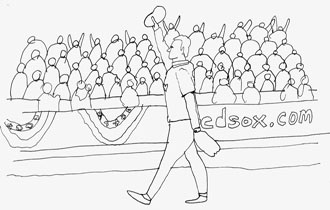 Okajima escaped further damage in the 7th. And, at that point, it was up to Colorado’s bullpen to keep the team’s suddenly spry offense in the game.
Okajima escaped further damage in the 7th. And, at that point, it was up to Colorado’s bullpen to keep the team’s suddenly spry offense in the game.
The task was too much, namely due to Boston’s lethal one-two punch at the top of its lineup. With the designated hitter slot on the shelf in the National League park, Francona sat first baseman and regular number-two hitter Kevin Youkilis, playing DH David Ortiz at first base.
The ever-patient Youkilis and rookie second baseman Dustin Pedroia, who usually hits leadoff, had proven themselves as the best table setters in post-season. But with Youkilis starting the game in the dugout and dressed for an arctic trek (he relieved Ortiz at first base in the sixth inning), Ellsbury took over the leadoff spot and Pedroia moved into the number-two slot. The two rookies combined for seven hits, three runs and four RBI.
Ellsbury and Pedroia all but torched the Rockies’ hopes in the top of the eighth with back-to-back doubles that plated three runs and pushed Boston’s lead to 9-5. The Red Sox added a run in the top of the ninth, when third baseman Mike Lowell singled, was sacrificed to second by Alex Cora, and then stole third base before scoring on a sacrifice fly by Jason Varitek. It was almost like the Red Sox wanted to use the ninth inning as an opportunity to practice a little small ball.
Right-handed reliever Manny Delcarmen filled the gap between Okajima and closer Jonathan Papelbon, allowing two base runners in the eighth but also recording two outs before Papelbon finished off the Rockies over the final 1 1/3 innings.
Game 4 — Sunday, 8 p.m. ET — Jon Lester (Boston) vs Aaron Cook (Colorado)
One note on Saturday’s Game 3. The contest clocked in at 4 hours and 19 minutes. That’s 18 minutes longer than the epic twelve-inning World Series Game 6 in 1975 between the Red Sox and Cincinnati Reds. Game 3, 2007, included ten pitching changes (the same as Game 6 in 1975), 15 runs scored (there were 13 in Game 6, ’75), and 26 hits (versus 24 hits in the ’75 Carlton Fisk classic). And you still had three extra innings of baseball in ’75. If tonight’s Game 5 goes twelve innings, viewers in Boston shouldn’t expect to be in bed before two a.m.
With Halloween approaching, even a baseball fan can’t help thinking about ghosts, specifically Derek Jeter’s favorites, Gehrig and Ruth, who apparently have taken up an October residence far from the Bronx these past few years. Meanwhile, the Red Sox, having shaken the Bambino’s curse in 2004, are in control of this year’s World Series thanks to elements that are far from supernatural, namely great pitching (both starting and relief) and patience at the plate.
In Game 1 on Wednesday night, the formerly red-hot Rockies accepted the fate of everyone who has faced Boston starter Josh Beckett in this year’s post-season: they were shut down like a counterfeit t-shirt vendor on Yawkey Way. One run, six hits and nine strikeouts over seven innings. Meanwhile, the Red Sox lineup slugged their way into double digits for a 13-1 win.
The Rockies’ hopes for winning game 2 at Fenway on Thursday night mainly rested on the shoulders of twenty-three-year-old rookie right-hander Ubaldo Jimenez. Colorado also needed to score some runs off Curt Schilling, the man who entered the game with a 10-2 career record in post-season contests. With the forty-year-old Schilling’s fastball mostly traveling in the high 80’s, this appeared to be a reasonable goal, especially for a team that had won 21 of its last 22 games before running into Beckett on Wednesday night.
It didn’t happen. The Rockies scored only one run, that coming in the first inning as a result of Schilling hitting leadoff man Willie Taveras with a pitch. Taveras moved to third on a sharply hit ball by Matt Holliday that glanced off the glove of Red Sox third baseman Mike Lowell. Lowell chased down the ball and made a throwing error when Schilling was late covering third base. Taveras scored on the play, but that was it for the Rockies. Schilling escaped only minor problems thereafter, locating his fastball and showing off a still-effective splitter while working 5 1/3 innings.
Jimenez held his own against Schilling through the first three innings, sporting a mid-90s fastball, tight slider, and looping curve. Red Sox hitters, however, knew that the rookie was prone to control problems, and they remained patient, a habit they’ve carried all season. Mike Lowell walked with one out in the fourth and hustled to third on J.D. Drew’s single to right. He scored to tie the game on Jason Varitek’s sacrifice fly.
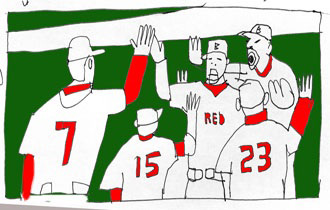 After retiring Boston’s always tough 1 and 2 hitters, Dustin Pedroia and Kevin Youkilis, to start the fifth, Jimenez allowed a walk to David Ortiz. Manny Ramirez followed by hammering a line drive single to left. That moved Ortiz to second. And then it was time for Lowell to come through again. The third baseman, Boston’s regular season RBI leader and a free-agent-to-be, doubled to left, scoring Ortiz and chasing Jimenez from the game.
After retiring Boston’s always tough 1 and 2 hitters, Dustin Pedroia and Kevin Youkilis, to start the fifth, Jimenez allowed a walk to David Ortiz. Manny Ramirez followed by hammering a line drive single to left. That moved Ortiz to second. And then it was time for Lowell to come through again. The third baseman, Boston’s regular season RBI leader and a free-agent-to-be, doubled to left, scoring Ortiz and chasing Jimenez from the game.
Schilling, who doesn’t have a contract for next season, left the game with one out in the top of the sixth. The Red Sox held a 2-1 lead and Boston fans were on their feet, realizing they had likely witnessed the right hander’s final game in a Red Sox jersey.
Sentimental thoughts were surely disrupted by the dominant performance of Hideki Okajima and Jonathan Papelbon out of the Boston bullpen. Okajima quickly subdued any ideas the Rockies had of rallying against him, allowing no hits and striking out four over 2 1/3 innings, before handing the ball to Papelbon, who struck out two over 1 1/3 innings.
The only threat to Papelbon was a liner up the middle by Matt Holliday with two outs in the eighth. Holliday, who had four hits on the night, stood at first as the tying run, with Rockies’ veteran Todd Helton at the plate. But not for long. Surprisingly, Papelbon caught Holliday leaning, picking him off with a throw to Youkilis. The only thing missing was the sound of air escaping from the tires of the Colorado team bus. The Rockies went down 1-2-3 in the ninth.
Heading to Denver for game 3 on Saturday night, the Rockies will probably try to exhibit at least some of the patience shown by Red Sox hitters in the first two games. The Colorado offense was slumping before they even got to Boston, hitting just .222 collectively against Arizona in the NLCS. Rockies hitters have shown a tendency to go fishing on pitches out of the strike zone during the first two games of the World Series. They’ve also hacked away quite a bit at first pitches during at bats. If the Denver altitude does happen to affect Boston starter Daisuke Matsuzaka’s breaking balls on Saturday night, a show of patience could go a long way toward helping the Rockies score some runs and edge their way back into the Series. They can hit fast balls.
Of course, Colorado will also need a good start from right-hander Josh Fogg. He won’t blow anyone away with his stuff, so it’ll be important to throw strikes, force the Red Sox to swing, and make good use of the Rockies’ defense and the vast outfield at Coors Field.
